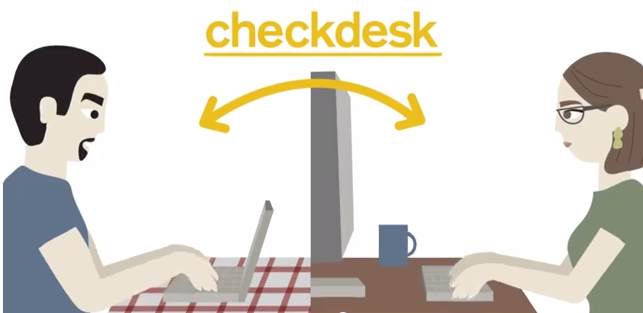Misinformation spreads like wildfire. How can you avoid the trap?
As social media continues to become a major tool for journalists (and everyone else) to gather information, we are all faced with a recurring question: how do we know what we read on social media is true?
We depend on social media as a source for information but when rumors or incorrect information goes viral, it can cause huge problems – such as after the bombings at the Boston Marathon [1], or throughout the events of the past few years during the Arab Spring and today during the ongoing Syrian conflict. In order to understand what is going on and what information is correct, we need verification.

Checkdesk [2], a project begun by nonprofit Meedan [3], is aiming to work against this problem. Rising Voices recently spoke with Dina El Hawary of Checkdesk [2] to learn more about the project and about why verification is so important.
From the Checkdesk website:
Checkdesk is a liveblogging tool for journalists, with built-in tools to allow citizen journalists and staff journalists alike to make and verify reports. Anyone from the newsroom community can submit a report — a Tweet, a photo, video or other type of media — and add details that bring important context to the report.
The project is intended for newsrooms, bloggers, or anyone working with citizen media, creating a platform to gather information from other outlets and use that information to create stories and updates. They depend upon crowd-based fact checking to verify reports.
When a newsroom opens a report for checking, other users can add their feedback or details to the report; eyewitnesses or knowledgable individuals can verify what has happened or contest the information. The entire process is open, allowing other viewers to see the process in action. The verification depends on the community.
Checkdesk is also on Github [4], the open platform for software sharing, and noted in their recent Knight News Challenge proposal that their goal is to be customizable and shareable, and element of the project which works to enhance the final result, says El Hawary.
The platform is currently used through partnerships and is working with media partners in different countries across the Arabic-speaking world:
- Welad Elbalad [5]- Egypt
- 7iber [6] – Jordan
- Al Masry Al Youm [7] – Egypt
- Shabab Suria [8] – Syria
- Maan [9] – Palestine
These partners have trained independent citizens [10] and citizen journalists in their surrounding communities in the use of Checkdesk to create a pool of people who can help to verify information. In addition, they have developed a pilot project [11]at the Lebanese American University in Beirut [12] with an investigative journalism class to continue developing the website – and the plan to take this further to other universities, to prepare a new generation of journalists to be aware of the importance of fact checking.
Checkdesk was also covered in the recently published Verification Handbook [13], contributing a case study on their partnership with Shabab Suria. They are also working with the publishers to translate the handbook into an open-licensed Arabic-language ebook. Ultimately, they say: [14] “Checkdesk is designed to address one of the crucial challenges of breaking news in the digital age: the balance between speed and accuracy”.
A video about how it all works: